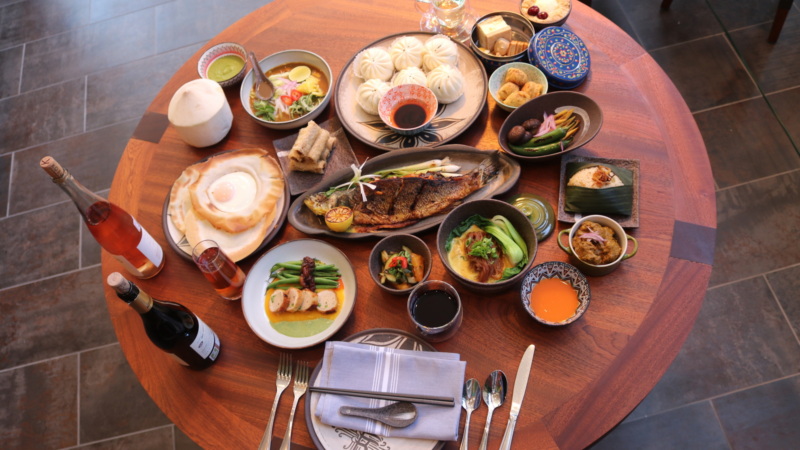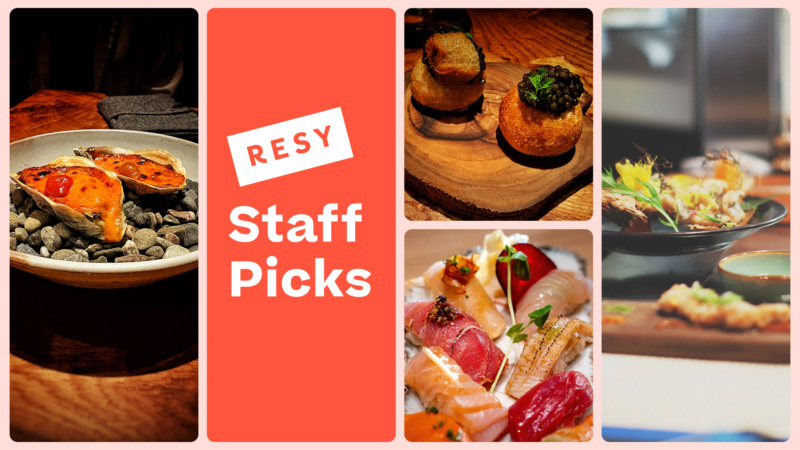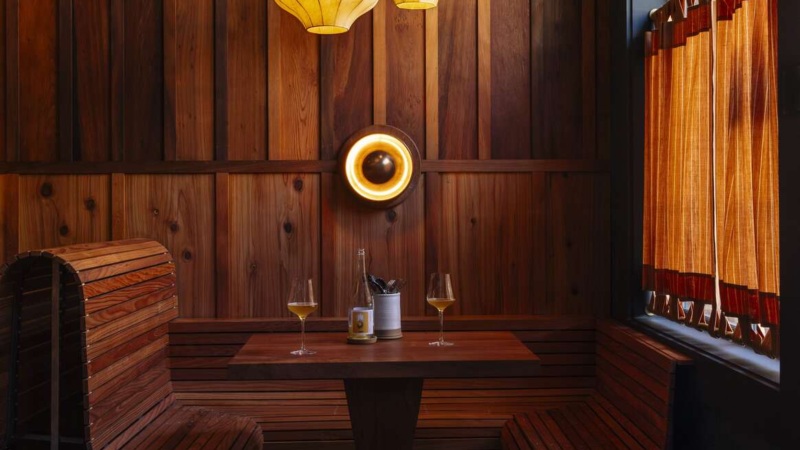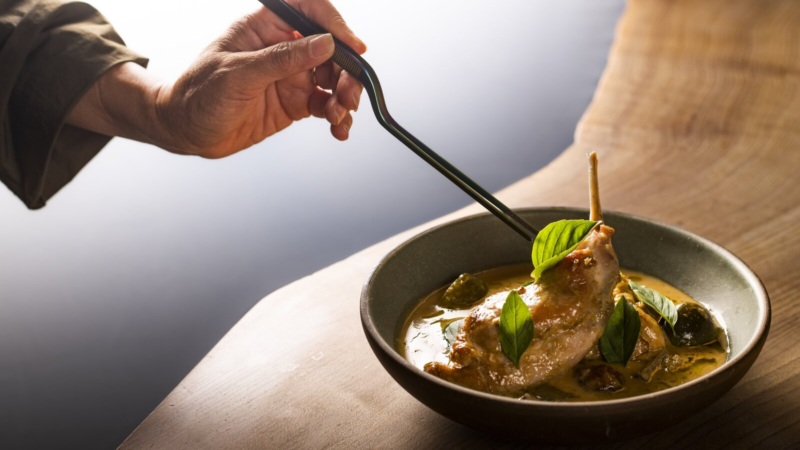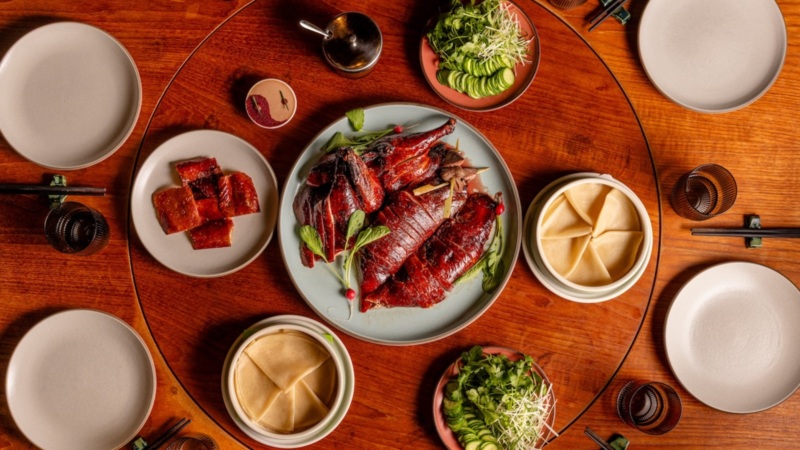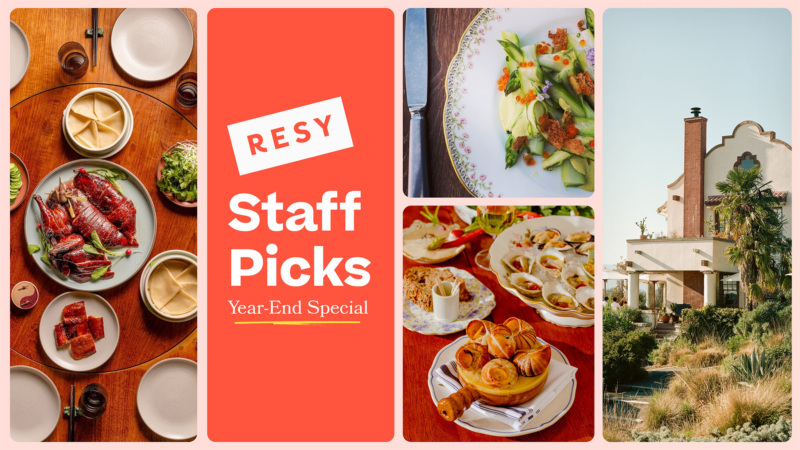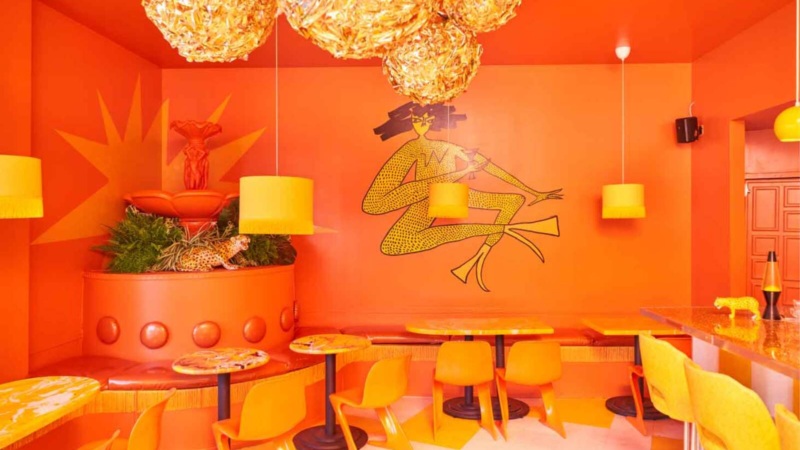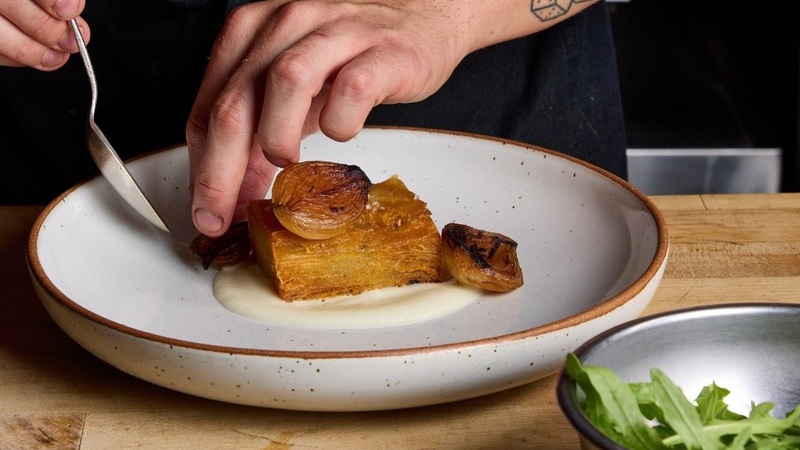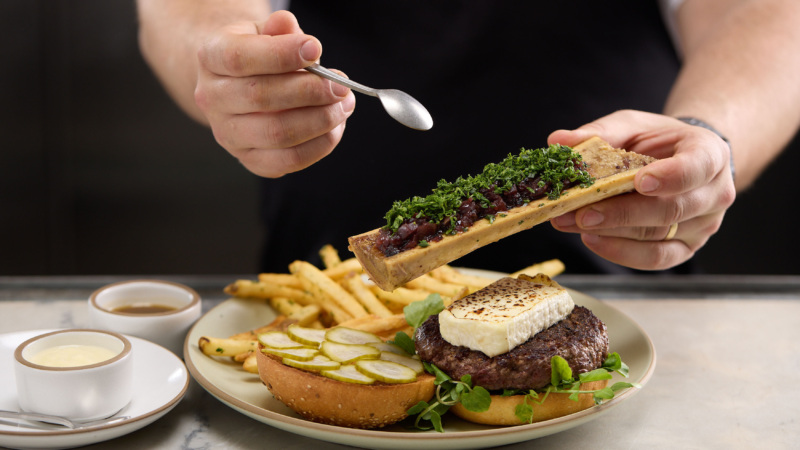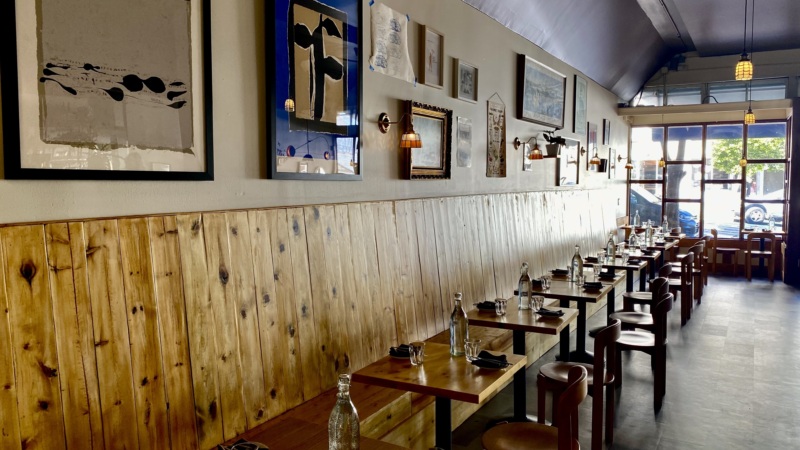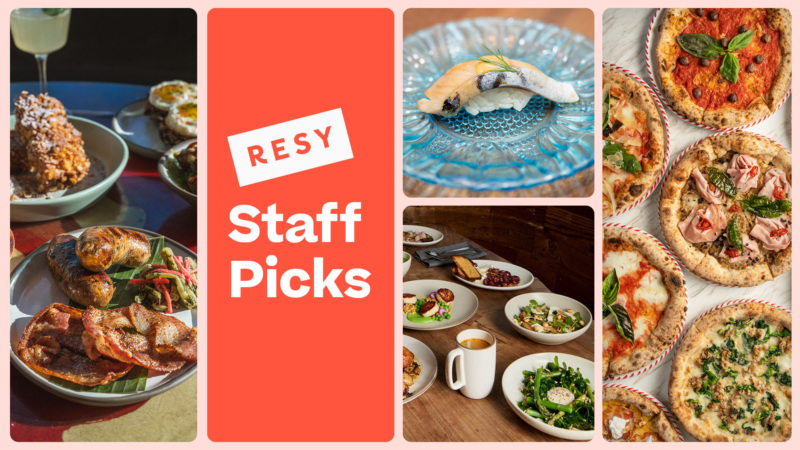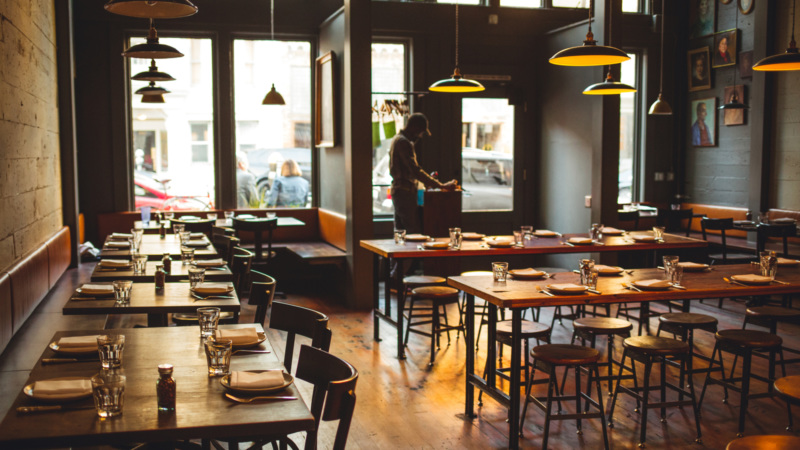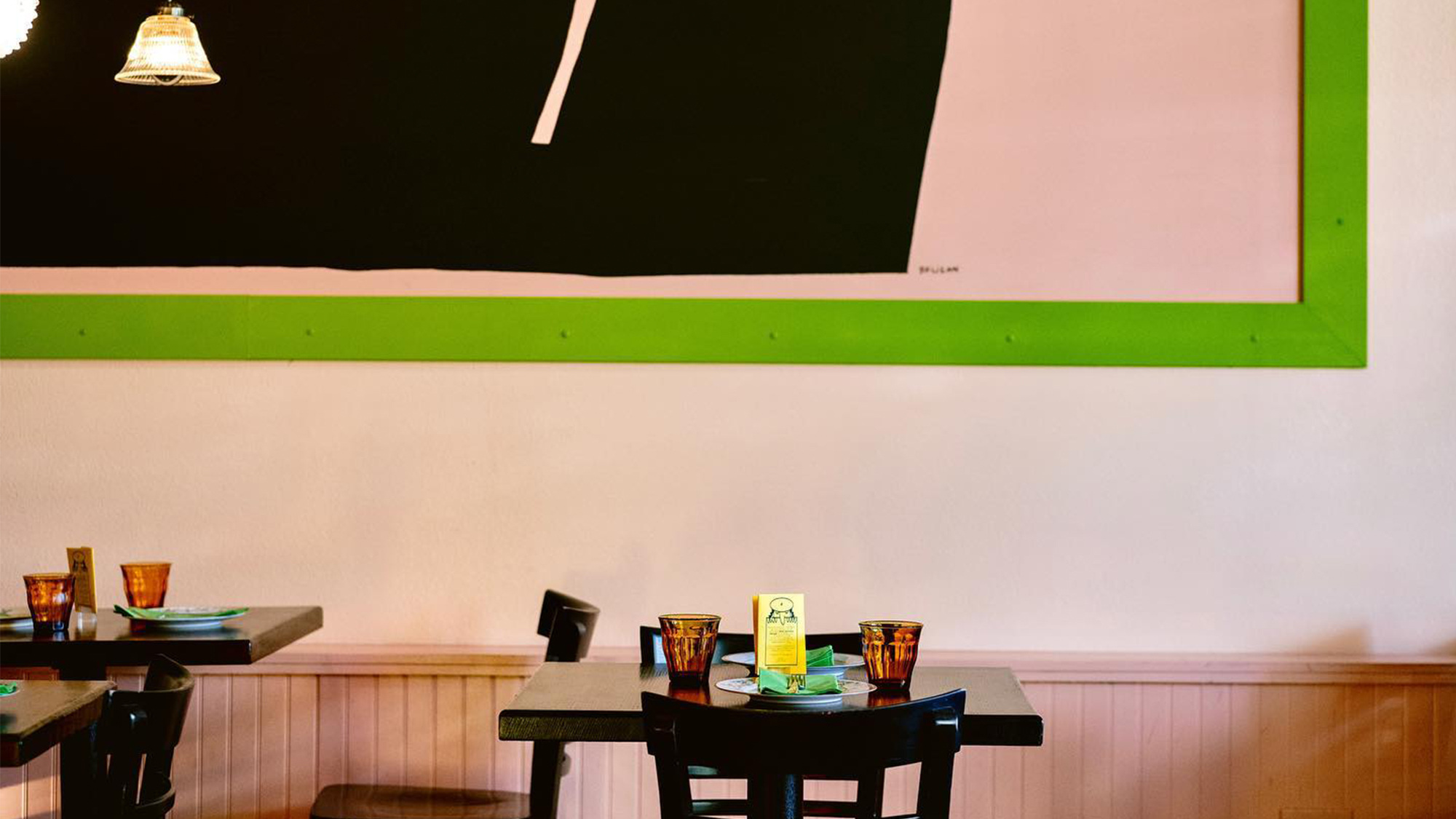
Interviews San Francisco Oakland
Oakland’s Daytrip Is One of America’s Best New Restaurants. But It’s Just Getting Started
Published:
Daytrip is the fun and energetic restaurant in Oakland that offers fermentation-driven party fare to pair with a long list of natural wines and sake. The colors are bright, the music is loud, and the vibes are right at the lively Temescal locale. Opened by Stella Dennig and Finn Stern a little over a year ago, Daytrip is now live on Resy, too. We sat down with the pair to learn more about their hit, which was named one of Bon Appetit’s Best New Restaurants in America. Right this way.
Let’s start from the beginning. How did you two meet? How did Daytrip start?
Finn Stern: We met a few years ago at Starline Social Club on the dance floor. We were both in transition periods — I was just getting out of the agriculture lobby world, a full-on office job. I had been in and out of kitchens; food was always the undercurrent to everything. I’m from D.C., and I grew up with the mindset that politics are everything
I came out here to lobby for environmental and agricultural policy. I was burned out and knew that the kitchen called. I met Stella the day that I put in my two weeks — the day I decided to go back into the kitchen to start looking at kitchen jobs. I went to Standard Fare.
Stella Dennig: When we met, we connected over food and community. We’re both people who dive in pretty hard and fast. That day, I accepted a job in New York. Eventually I’d quit my job, and we’d start a catering company together, with the intent of starting a brick-and-mortar after some time. We wanted something that involved food and community.
Why is it called Daytrip?
SD: We were on a date in a park drinking wine on a day trip — we had been thinking about names for a while, and it popped up and we sat with it for a minute. We thought it could work. It felt like a good fit: For us, a day trip is a special occasion, it’s inherently casual and fun. That embodies a lot of the energy.
When people really feel comfortable sharing direct feedback, that makes me feel like I am building a safe space where people will be heard.— Stella Dennig, Daytrip
You’ve been open for just a little over a year — how’s it been going?
FS: It’s definitely the hardest thing either of us have either done, but also the most rewarding. We have the most amazing team in the world, and every day is a challenge, and every day is super fun. We’ve had a lot of success and it’s been amazing to see it busy, and honestly, we’re still figuring out the financial aspect.
SD: Figuring it out in a way that’s good for the people that work in it. But when you’re trying to do things when you allow for a living wage, in a place like the Bay, it’s much harder.
What’s been the biggest challenge over the last year?
FS: The biggest for me: The balance of putting our team first, and valuing our own mental health and sanity. Stella and I have been working 18- and 20-hour days the last year. The last two months haven’t been the case; we didn’t necessarily know how to ask for everything we needed in the beginning. It’s definitely a learning process of how to treat ourselves
SD: No one is working 60 hour weeks — our goal is to have people working 40 to 45 hours a week. We’re very far from modeling that ourselves. The biggest challenge is something we’re proud of, but not sustainable. There are so many aspects of the industry that are stressful; I think this industry has a lot of stress. It’s a lot easier to let that come out as an owner and pass that to the people. We carry a lot of weight ourselves. We’re trying to ask for help — trying to get to a place where we can ask for help that’s manageable and sustainable.
What’s the most rewarding part about running Daytrip?
SD: One thing we’ve been working on is to cultivate a culture of feedback. We create formal opportunities everyday for sharing feedback amongst the team. And that feedback goes every direction. When people really feel comfortable sharing direct feedback, that makes me feel like I am building a safe space where people will be heard. And it’s in the interest in improving us as a whole — those are moments that are really important for me.
FS: One thing that I’ve actively tried to do with our kitchen is try to foster an environment of curiosity and collaboration. There is me as a head chef, I have a sous chef — so there is hierarchy. But every level of back-of-house employee feels super comfortable giving ideas, pushing back, telling me when they don’t like an idea, and I do think that makes the food better. I think our food is better because there are more voices speaking up.
I believe in the social capital and power of restaurants and I believe in their ability to change culture— Finn Stern, Daytrip
What are some things that are always on the menu?
FS: The menu changes often — at least a dish a week. We always need a raw fish dish, a raw meat dish, and I like to have a number of dishes that are vegetarian. A direction I really want to move in is taking big pieces of meat off the plate, and in a few months that’ll be actualized.
But there are three things that are always there: The house sourdough focaccia. We serve that with a vinegar that we ferment in house that changes week to week — there’s a fermentation focus.
Our celery salad — a spicy crunchy salad — with aged Sardinian sheep’s milk cheese, and a lemon verbena chlorophyll that provides color and flavor.
And then our miso butter pasta. We’re currently using a honey nut miso, along with lacto-fermented pepper flakes.
Where did the fermentation love start?
FS: I’ve been nerding out about fermentation for years, but it was a really natural direction for my obsession. I just started obsessing over it at home. There’ve been a number of strong smart fermentation books to come out the last 15 years or so, and that’s been really helpful. We try and pull from techniques not just from France and Italy — and that’s really helped define us.
Tell us more about the beverage program.
SD: Our beverage director is Jenny Eagleton (The Punchdown) — the program is 100% hers. She has full ownership over it. She’s really crafted the program to be focused on low-intervention wines, not in a dogmatic natty wine direction, but more from the holistic angle of wanting to put our resources into farmers and winemakers who are growing grapes and treating the earth in a sustainable way, whether that’s organic or biodynamic, but also in a community oriented way.
But there’s an equally big focus on non-wine things — beautiful ciders, beer, sake, and a growing NA collection that Finn is starting to build out.
FS: It’s an untapped market in many ways that can produce great stuff. So right now, we have one option but the goal is to have three or four in the next month. There’s a pink pearl apple shrub that makes a beautiful pink vinegar that we mix with a rosemary and sage simple syrup, as well as a little citrus. It’s lightly carbonated, super refreshing. It eats with food really well.
There’s an automatic 20% service charge included. How does that work? Does that model work?
SD: We do a fully even tip distribution between all members of the house. And everyone gets an equal pay, proportional to hours worked over a two-week period.
It’s been working really well. We put a lot of thought into that before we opened. I talked to lots of different owners — I had a lot of people pushing a 70/30 split. At the end of the day we felt rooted — the even split is the only thing that made sense for us. Because we made that decision, we were clear and transparent. We attracted candidates who were here for that. Where their wages weren’t being stripped off labor in unjust ways. It helps cultivate an environment where everyone really believes in that. No one is bringing home less than $30/hour in any position. It’s still really competitive in the industry.
Are there any of sort big overall goals that you have?
FS: Politics are what really drive me. In my case, I let myself fall down the rabbit hole of getting obsessed with restaurants and food through the lens of agriculture. I believe in agriculture’s power in the world because it affects so many lives and it’s a large industry globally. I left the purely political legislative world, because I believe in the social capital and power of restaurants, and I believe in their ability to change culture. Restaurants can help drive change. The first year was definitely learning how to run a restaurant and make it financially stable and treat everyone well.
SD: I think that we recognized the power of a brick-and-mortar — the conversations are not to be underrated. With the power a brick-and-mortar has and the clout restaurants have, there’s opportunity to have conversation that leads to new ideas and policy shifts.
Omar Mamoon is a San Francisco-based writer & cookie dough professional. Find him at @ommmar.









